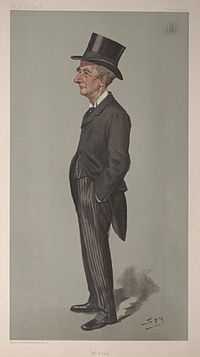Sir William Anson, 3rd Baronet
| The Right Honourable Sir William Anson, Bt PC | |
|---|---|
 | |
| "All Souls". Caricature by Spy published in Vanity Fair in 1901. | |
| Parliamentary Secretary to the Board of Education | |
| In office 11 August 1902 – 4 December 1905 | |
| Monarch | Edward VII |
| Prime Minister | Arthur Balfour |
| Preceded by | New office |
| Succeeded by | Thomas Lough |
| Personal details | |
| Born | 14 November 1843 Walberton, Sussex |
| Died | 4 June 1914 |
| Nationality | British |
| Political party | Liberal Unionist |
| Spouse(s) | Unmarried |
| Alma mater | Balliol College, Oxford |
Sir William Reynell Anson, 3rd Baronet PC, LL.D. (14 November 1843 – 4 June 1914) was a British jurist and Liberal Unionist politician[1] from the Anson family.
Background and education
Anson was born at Walberton, Sussex, the eldest son of Sir John William Hamilton Anson, 2nd Baronet, and his wife Elizabeth Catherine (née Pack). Educated at Eton and Balliol College, Oxford, he took a first class in the final classical schools in 1866, and was elected to a fellowship of All Souls in the following year.
Legal and political career
In 1869, he was called to the Bar, and went the home circuit until 1873, when he succeeded to the baronetcy. In 1874, he became Vinerian reader in English law at Oxford, a post which he held until he became, in 1881, Warden of All Souls College.[2]
Anson identified himself both with local and university interests; he became an alderman of the city of Oxford in 1892, chairman of quarter sessions for the county in 1894, was Vice-Chancellor of Oxford University in 1898–1899, and Chancellor of the Diocese of Oxford in 1899. In that year he was returned, without opposition, as Member of Parliament (MP) for Oxford University in the Liberal Unionist interest, and consequently resigned the vice-chancellorship.
In Parliament, Anson preserved an active interest in education, being a member of the newly created consultative committee of the Board of Education in 1900, and in 1902 he became the first Parliamentary Secretary to the Board of Education, a post he held until 1905. He was made a Privy Counsellor in 1911.
Anson took an active part in the foundation of a school of law at Oxford, and his volumes on The Principles of the English Law of Contract (1884, 11th ed. 1906), and on The Law and Custom of the Constitution in two parts, "The Parliament" and "The Crown" (1886–1892, 3rd ed. 1907, pt. 1 .vol. ii.), are standard works.[3]
He received the honorary degree Doctor of Laws (LL.D.) from the Victoria University of Manchester in February 1902, in connection with the 50th jubilee celebrations of the establishment of the university.[4]
Personal life
Anson died in June 1914, aged 70. He never married and was succeeded in the baronetcy by his nephew, Denis.
See also
- Oxford Dictionary of National Biography
- English contract law
References
- ↑ Lundy, Darryl. "Rt. Hon. Sir William Reynell Anson, 3rd Bt.". The Peerage..
- ↑ Salter, H. E. and Lobel, Mary D., ed. (1954). "All Souls College". A History of the County of Oxford: Volume 3: The University of Oxford. Victoria County History. pp. 173–193. Retrieved July 15, 2011.
- ↑ Books by Sir William Reynell Anson, Alibris.
- ↑ "University intelligence" The Times (London). Saturday, 1 March 1902. (36704), p. 12.
Further reading
- Anson's Law of Contract (29th edn, OUP, 2010) now edited by J Beatson, A Burrows and J Cartwright.
External links
- Hansard 1803–2005: contributions in Parliament by Sir William Anson, Bt
- Pictures in the National Portrait Gallery (London)
| Academic offices | ||
|---|---|---|
| Preceded by Francis Knyvett Leighton |
Warden of All Souls College, Oxford 1881–1914 |
Succeeded by Francis William Pember |
| Preceded by John Richard Magrath |
Vice-Chancellor of Oxford University 1898–1899 |
Succeeded by Thomas Fowler |
| Parliament of the United Kingdom | ||
| Preceded by John Gilbert Talbot Sir John Mowbray, Bt |
Member of Parliament for Oxford University John Gilbert Talbot, 1899-January 1910; Lord Hugh Cecil January 1910-1914 1899–1914 |
Succeeded by Rowland Prothero Lord Hugh Cecil |
| Political offices | ||
| New office | Parliamentary Secretary to the Board of Education 1902–1905 |
Succeeded by Thomas Lough |
| Baronetage of the United Kingdom | ||
| Preceded by John William Hamilton Anson |
Baronet (of Hatch Beauchamp) 1873–1914 |
Succeeded by Denis George William Anson |